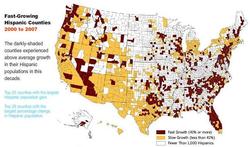Were GOP senators looking at home-state demographics in softening on Sotomayor?
Many of the senate Republicans expected to lead the attack against Judge Sonia Sotomayor's nomination for the Supreme Court ended up backpedaling and even endorsing her. How did that happen?
An NPR report today echoes what others have been saying -- that it was at least partially a calculation about election politics, especially as 2010 contests loom near:
It's clear that many of the GOP senators who toned-down their opposition or came to endorse Sotomayor come from states deeply affected by Latino immigration -- and where Latinos are seeing growing clout in politics. Consider this map from the Pew Hispanic Center, charting the states with the most rapid Hispanic growth:

Southern states like Alabama, Florida, Georgia, North Carolina, South Carolina and Texas have seen some of the biggest gains in the country.
Now consider how GOP senators from these states are lining up on Sotomayor, according to NPR:
* Sen. Mel Martinez (FL) -- Will vote for Sotomayor
* Sen. Jeff Sessions (AL) -- Sees "no reason" to hold up Sotomayor vote
* Sens. Lindsey Graham (SC) and John Cornyn (TX) are now calling Sotomayor's voting record "mainstream"
By contrast, the two Senate Republicans still expressing strong opposition are Sen. Mitch McConnell of Kentucky and Sen. Robert Bennett of Utah -- two states that haven't been affected nearly as much by the growth of new immigrant and Latino communities.
Surely, a host of factors have been in play during the confirmation hearings. But it seems likely that one of them were GOP senators sizing up the political costs of fighting the Supreme Court's first Hispanic nominee
An NPR report today echoes what others have been saying -- that it was at least partially a calculation about election politics, especially as 2010 contests loom near:
Three centrist Republicans announced they'd support Sotomayor even asthe Senate's minority leader, Sen. Mitch McConnell of Kentucky, saidhe'd vote no. The split was a vivid reflection of the divisions in theGOP as the party faces a tricky vote on Sotomayor, wary of alienatingits conservative base but equally afraid to anger Hispanic and womenvoters.Facing South has often reported on the political implications of the South's rapidly-growing Latino population, and it's an especially interesting factor to consider in this week's Sotomayor debate.
It's clear that many of the GOP senators who toned-down their opposition or came to endorse Sotomayor come from states deeply affected by Latino immigration -- and where Latinos are seeing growing clout in politics. Consider this map from the Pew Hispanic Center, charting the states with the most rapid Hispanic growth:

Southern states like Alabama, Florida, Georgia, North Carolina, South Carolina and Texas have seen some of the biggest gains in the country.
Now consider how GOP senators from these states are lining up on Sotomayor, according to NPR:
* Sen. Mel Martinez (FL) -- Will vote for Sotomayor
* Sen. Jeff Sessions (AL) -- Sees "no reason" to hold up Sotomayor vote
* Sens. Lindsey Graham (SC) and John Cornyn (TX) are now calling Sotomayor's voting record "mainstream"
By contrast, the two Senate Republicans still expressing strong opposition are Sen. Mitch McConnell of Kentucky and Sen. Robert Bennett of Utah -- two states that haven't been affected nearly as much by the growth of new immigrant and Latino communities.
Surely, a host of factors have been in play during the confirmation hearings. But it seems likely that one of them were GOP senators sizing up the political costs of fighting the Supreme Court's first Hispanic nominee
Tags
Chris Kromm
Chris Kromm is executive director of the Institute for Southern Studies and publisher of the Institute's online magazine, Facing South.
